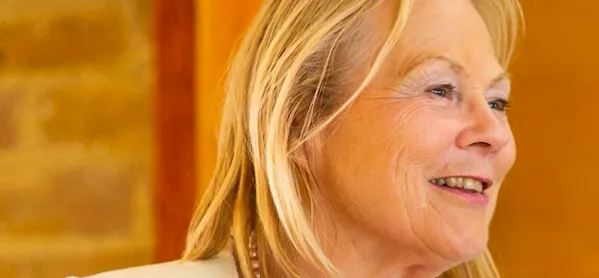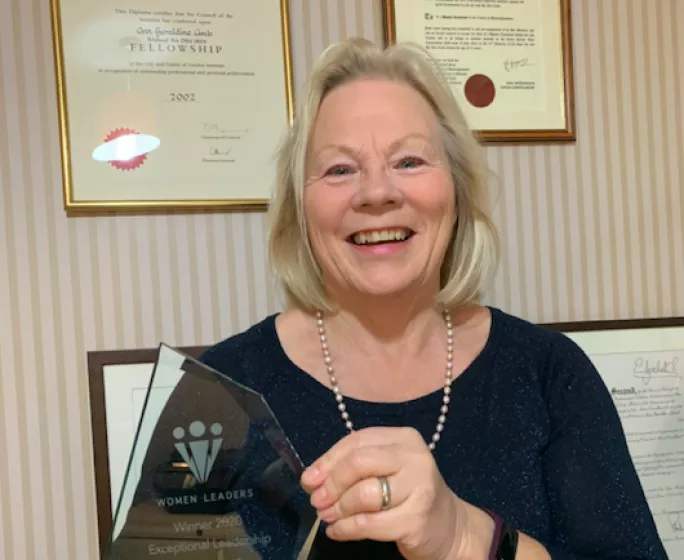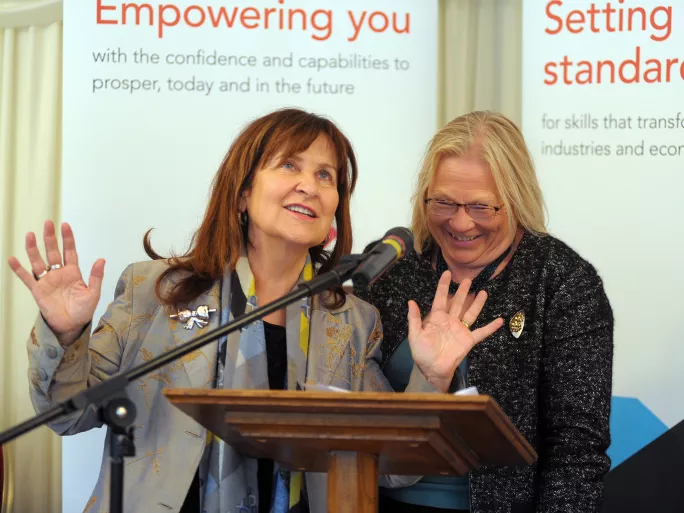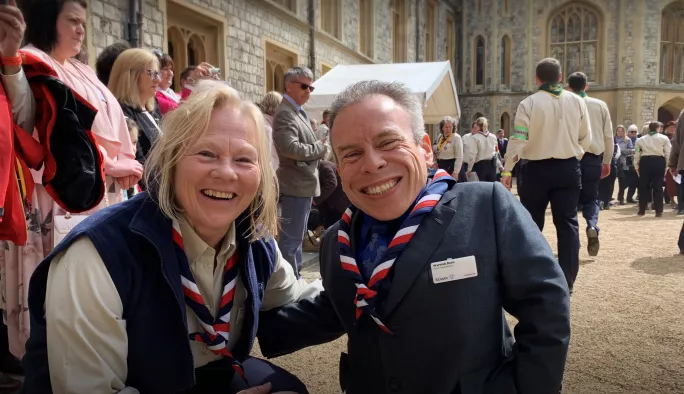Meet Ann Limb: Further education icon

It’s the early 1980s. Ann Limb is teaching applied languages at Derbyshire College, in the heart of the mining community. She sees the displacement and suffering of the families around her, and is desperate to help.
Her attention turns not to the miners themselves, but to their girlfriends, wives, daughters - and so she decides to set up a “Women into Technology” programme to retrain them in digital skills, provide access to the workplace and, vitally, allow them to financially support their families when their men are involved in the miners’ strike.
The programme is a success, and Limb changes the course of many of these women’s lives. And 40 years on, the impact is still being felt.
“These days, I do my ‘famous gay icon bit’, and my name appears in the newspapers when it’s the birthdays, in the Telegraph, The Times, The Guardian,” Limb laughs.
“Anyway, last summer, a woman who was on one of those courses in the early 80s, the Women into Technology course, wrote to me, and she said, ‘I just wanted to say how it changed my life, and what an incredible experience it was getting those computer skills. I’ve built up a business since then, and I did this and I did that. Oh, and by the way, I volunteer for the Scouts.’ So, you know, it’s very rare, isn’t it, in teaching, when people tell you you’ve done something for them? And 40-odd years on - it was so special.”
The list of the lives that Limb has influenced in her career seems to go on forever - much like her CV. She started out teaching FE, became a principal, co-founded the Helena Kennedy Foundation, set up and chaired local enterprise councils, and in 2015 was named the first female chair of the Scouts.
This year will be her last in the position, but, make no mistake, Ann Limb is not retiring quietly, and will remain at the core of the further education sector as the chair of City and Guilds Group. “This is a world which I know and care about immensely. I’m not leaving it behind,” she says.
News: Colleges have responsibility to act on sexual harassment
More: Ann Limb hails ‘golden age for professional and technical education’
By Ann Limb: Has Boris Johnson ever experienced hunger?
Limb grew up in Manchester, and for her early childhood, lived above a butcher’s shop in Moss Side with her younger sister and parents. Both her parents worked in the shop below - as did Limb. “I was my dad’s little helper and would carry bits of meat on those ghastly metal hooks used in old-fashioned butchers. He would hook the meat over his thumb and I’d copy him, but, of course, I was only 2 or 3, so wasn’t as strong as him,” she says.
Limb describes her primary education at Norbury Hall School as incredibly “creative and enlightening” - the headteacher wrote plays and immersed all the children in the arts and culture.
Everything changed after she passed the 11-plus and went to Marple Hall County Grammar School for Girls, which had a very different approach to learning.

But inspired by her teachers - two of whom she still talks to today - Limb decided she wanted to teach. Her parents were thrilled: it was a stable job, with a state pension - a real golden ticket for a working-class family in the late 60s.
The inspiration to pursue a career in further education
Limb loved languages, and went on to study French at the University of Liverpool - as the first in her family to enter higher education - and on graduation, got a job teaching French and English as a second language part-time at what is now The Manchester College. Within a few years, she moved to Buxton College, publishing books on how to make languages practical and more appealing to young people along the way.
“I always want to try and do something better, or if I see an opportunity to develop things, and make it more interesting or more creative, or engage more people in it, I’ll sort of experiment,” she says.
Her 10-year climb to the top of the FE ladder has been well-documented. In 1987, she was appointed principal of Milton Keynes College, and made the history books in doing so: she was just 34, the youngest person ever to be appointed as a principal.
It was at Milton Keynes that Limb met her wife, Maggie, who she says, “does not take any nonsense” from her and keeps her ego in check. That time of her life, she says, was one of the most exciting periods.
“It was a very rapid journey, and I was quite young, and there were very few women, but I did stay, and I think those 10 years were the most progressive period of my career,” she says.
Incorporation of colleges, she says, allows providers like Milton Keynes to have greater freedom, take on greater responsibilities, and, crucially, pursue greater growth. In 1997, as Tony Blair and the Labour Party came into power, several things changed for Limb. She moved across to Cambridge Regional College as principal, feeling she’d done all she could at Milton Keynes. There, she was visited by Andrew Adonis, Blair’s educational policy adviser.
“He said to me, ‘Ann, these general FE colleges, they don’t work. It’s like a supermarket with too many different aisles and products, and people don’t know what they’re doing.’ They just did not get FE,” she remembers.
When Blair introduced the target of 50 per cent of people going to university, and proposied a £1,000 up-front tuition fee to attend, Limb was aghast. “Can you imagine FE students being able to manage that? Many of whom are already on their second chance? It outraged me,” she says.

And so she decided to do something about it. Limb contacted Helena Kennedy, who at that time had written her landmark report for FE, and together they set up the Helena Kennedy Bursary Scheme, which granted FE students the £1,000 to allow them to access higher education. Limb contributed a lot of her own salary to the scheme - and today, it exists as the Helena Kennedy Foundation, a thriving charity that continues to break down barriers to higher education for disadvantaged students.
Financial support for disadvantaged FE students
“It’s helped over 2,000 students, all from FE: some of them are authors, some of them are heads of social services - they are in great places where great FE people go. It’s wonderful, and I always thought long-term. I thought, within 25 years, one of the students who has been given a very small amount of money at a terribly difficult time in their life and for whom it has meant everything in terms of belief [in them by] another person, they’re going to make millions,” she says.
“And they’re going to think, ‘I’ll give a little bit of money back as an endowment.’ Although I have put loads of my own money into it, I haven’t got the sort of money where I could put it in forever. I’m still waiting for Mr or Mrs millionaire to come along... I’ve got my eye on one or two, it will happen.”
And of course, while setting up the charity, Limb continued to work as a principal in Cambridge. Two years into her leadership, then education secretary David Blunkett asked her to go and run Sheffield College, which was struggling. But Limb had committed to Cambridge, and turned him down. He then offered her a voluntary role as chair of the University for Industry, which she accepted. Two years later, in 2001, she felt it was time for a change and, already heavily invested in the purpose of UfI, she left the college to become its chief executive.
Another 15 years of a stellar career followed: in 2005, she set up and became the chair of the Milton Keynes Partnership, which looked specifically at aligning economic geography with skills needs. The experience, she says, was invaluable.
“I acquired an understanding of skills in planning, housing, regeneration, and it’s been like having a second career. It’s really helped put FE in the perspective of place, and actually understanding the importance of locality,” Limb says.
“The role took me into a world where I’ve developed into a sort of independent business leader, a non-democratically elected civic leader, an apolitical, independent, fair champion of a collective cause for a community.”

And when the coalition government introduced local enterprise partnerships, Limb was appointed chair of the South East Midlands LEP - and while she loved the role, she’s critical of LEPs generally.
“You are convening power with voice, who will promote a whole range of different interests, because you have no vested interest in one thing, and that’s the kind of leader I think I am and have been in those roles. So yes, creating an LEP, getting all the politicians on side and sorting the processes, was great,” she says.
“But all the while some of those LEPs were just wasted. They just weren’t doing anything. And it’s no wonder the LEPs are toast now. People used to say about the FE system, ‘Oh yes, the FE system, there are some good colleges - but it’s kind of rubbish.’ Well, the LEPs rapidly developed into that, because they didn’t get their act together.”
Leaving a legacy
So Limb left the world of LEPs behind: and went on to chair several other organisations and foundations, most notably, perhaps, the Scouts. Her passion for which shines through.
“The exposure to young people in an informal learning environment is brilliant. I’ve been in formal learning environments all my life, but doing stuff with young people in and outdoors, in an informal learning environment and everybody being able to be a learner and a teacher, so genuine skills for life, is massive and I’ve learned so much from young people. To have the opportunity has just been so enjoyable and so enriching,” she says.
She talks about a “historic” decision the Scouts have made under her leadership: the launch of “Squirrels” for younger children aged between 4 and 6, and, crucially, from disadvantaged backgrounds. It’s something she says the Duchess of Cambridge, the joint-president of the Scouts, is really passionate about - and Limb is too.

“To have been a part of a decision which will live beyond me and will do really good things for the learning of young people is a great privilege,” she says.
And so whether it’s through the Women in Technology programmes from the 80s, the immense impact of the Helena Kennedy Foundation, or the introduction of Squirrels in the Scouts, Limb has built an incredible legacy. And as she steps up to chair City and Guilds in November, who’s to say where Limb’s influence and legacy will extend next.
You need a Tes subscription to read this article
Subscribe now to read this article and get other subscriber-only content:
- Unlimited access to all Tes magazine content
- Exclusive subscriber-only stories
- Award-winning email newsletters
Already a subscriber? Log in
You need a subscription to read this article
Subscribe now to read this article and get other subscriber-only content, including:
- Unlimited access to all Tes magazine content
- Exclusive subscriber-only stories
- Award-winning email newsletters